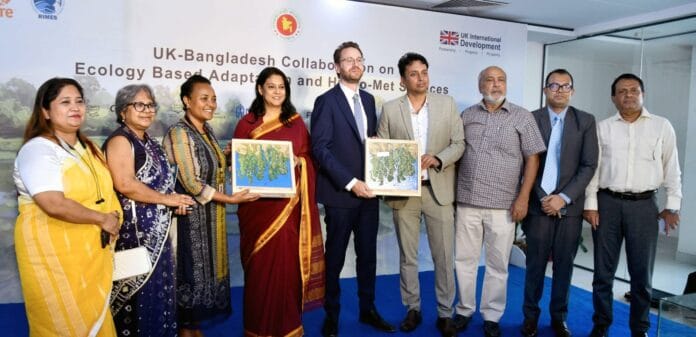Syeda Rizwana Hasan, Adviser to the Ministry of Environment, Forest and Climate Change (MoEFCC) and the Ministry of Water Resources (MoWR), has said that the UK-supported EnRICH Project will significantly strengthen flood forecasting and early warning systems in Sylhet, Sunamganj, Cumilla, and Feni between September 2025 and March 2026.
She made the remarks while addressing a national event titled “UK-Bangladesh Collaboration on Ecology-Based Adaptation and Hydro-Met Services” as the Chief Guest at Pani Bhaban, Dhaka, on Monday.
Rizwana Hasan commended the UK Met Office’s collaboration with RIMES, BWDB, and BMD under the new initiative, noting that it would enhance Bangladesh’s capacity to interpret rainfall and hydrological data.
“Our meteorologists often struggle to forecast sudden floods or upstream water surges accurately. Over the next six months, this partnership will enhance our analytical capacity to interpret rainfall and hydrological data more effectively,” she said.
The Advisor stressed the need for stronger coordination between government agencies and development partners, pointing out that the sustainability of NGO-led projects depends on institutional collaboration with the government.
Highlighting the ecological importance of the Haor wetlands, Rizwana Hasan warned that the collapse of the Haor ecosystem would directly threaten Bangladesh’s food security.
“If the Haor ecosystem collapses, our food supply will drop. Protecting Haor means protecting the country’s overall ecosystem,” she said.
She added that although the National Haor Master Plan has been finalized, the Haor Development Board still lacks an approved administrative structure, which hampers implementation.
Rizwana Hasan also revealed that the government has drafted the Haor and Wetland Ordinance, and a protection order under the Water Act covering Hakaluki and Tanguar Haor is ready for gazette notification. Once approved, these wetlands will be managed as climate- and agriculture-friendly ecosystems.
“Haor is deeply linked with our food system — when water or electricity supply falls, food security suffers. It is our national duty to protect this ecosystem for the wellbeing of our people,” she said.
She further mentioned that Haor communities are often deprived of essential services, including healthcare.
“We are exploring a boat-based hospital model that can operate both during floods and in the dry season,” she said, adding that such a project from the Health Ministry could be considered under the Climate Change Trust Fund.
The event, attended by over 150 participants — including government officials, development partners, academics, and civil society representatives — reaffirmed a shared commitment to climate resilience and locally led adaptation in Bangladesh.
Among the distinguished guests were Emebet Menna, Deputy Country Director – Programme, CARE Bangladesh; James Goldman, Deputy High Commissioner and Development Director, British High Commission, Dhaka; Professor Dr. Ainun Nishat, Advisor, C3ER, BRAC University; Selina Shelley Khan, Chief of Party, NABAPALLAB, CARE Bangladesh; and Roufa Khanum, Assistant Director, C3ER, BRAC University.
The event also showcased the achievements of the UK-funded NABAPALLAB Project in the Sundarbans Ecologically Critical Area (ECA) and announced its expansion to Hakaluki Haor, one of South Asia’s largest wetlands.
A panel discussion featuring experts from ADB, CNRS, RSF, and the Bangladesh Forest Department underscored the importance of integrating Nature-Based Solutions (NbS) and Locally Led Adaptation (LLA) into Bangladesh’s national climate strategies.

